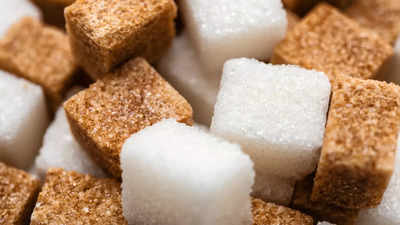Trending
Brown sugar vs white sugar: Which is healthier
White sugar, processed from cane or beets, lacks minerals unlike brown sugar, which contains molasses and is used in baking. Both sugars are high in calories and can cause health issues like obesity and diabetes. Expert advice suggests moderation and using sweeteners like honey, coconut sugar, or stevia for better health outcomes.

Sugar is an integral part of our diet. From beverages to desserts, sugar is widely used in different forms to add sweetness to delicacies across cuisines. But, when it comes to nutritional values, white sugar is often questioned and on the other hand, brown sugar is considered to be a healthier option. But, is it really true? Let us find out.
Processing at a Glance
White Sugar: It is made from sugar cane or sugar beets, white sugar undergoes a refining process that removes molasses, resulting in pure sucrose crystals. The process of making white sugar involves extracting juice from sugar cane or beets, filtering it, and then crystallizing the sucrose. It undergoes several stages of purification to remove molasses and other impurities, resulting in its white color and fine texture.
The process of making white sugar involves extracting juice from sugar cane or beets, filtering it, and then crystallizing the sucrose. It undergoes several stages of purification to remove molasses and other impurities, resulting in its white color and fine texture.
Brown Sugar: On the other hand, brown sugar contains molasses, either retained during processing or added back to refined white sugar, giving it a distinct color, flavor, and slightly different nutritional profile. Brown sugar undergoes less processing compared to white sugar, which allows it to retain more of its natural properties.

Nutritional Differences
Calories and Carbohydrates: Both types of sugar contain similar amounts of calories and carbohydrates. A teaspoon of either white or brown sugar contains about 15-17 calories.
Minerals:
Brown Sugar: Contains small amounts of minerals like calcium, potassium, iron, and magnesium due to the presence of molasses. However, the quantities are minimal and do not significantly contribute to daily nutritional requirements.
White Sugar: devoid of these minerals due to the refining process.
Also Read:7 Indian sugar alternatives for seniors
Glycemic Index:
Both brown and white sugars have a similar glycemic index (GI), which measures how quickly foods raise blood sugar levels. They can both cause rapid spikes in blood glucose.

Flavour and Usage
Flavour: Brown sugar has a richer, more complex flavor due to the molasses content, making it popular in baking and for adding depth to certain dishes. White sugar has a cleaner, sweeter taste.
Usage: Brown sugar is often used in recipes where moisture and a deep, caramel-like flavor are desired, such as in cookies and cakes. White sugar is used universally in baking, beverages, and other culinary applications.
Health and Nutritional benefits
Nutritional Value: While brown sugar contains trace minerals, the differences in nutritional value are minimal. Neither type offers significant health benefits. Brown sugar contains trace amounts of minerals like calcium, potassium, iron, and magnesium, due to the molasses content, which is absent in white sugar.
Caloric Content: Both sugars are high in calories and can contribute to weight gain if consumed in excess. They should be consumed in moderation.
Impact on Health: High consumption of any type of sugar is associated with health issues like obesity, type 2 diabetes, heart disease, and dental problems.
Side effects: Consuming excessive amounts of white sugar can lead to insulin resistance, increasing the risk of developing type 2 diabetes.
What are the sugar alternatives
Natural Sweeteners: One can consider using natural sweeteners like honey, maple syrup, agave nectar, or coconut sugar, which might offer additional nutrients.
Artificial Sweeteners: For those looking to reduce calorie intake, artificial sweeteners like stevia, aspartame, or sucralose can be used, but they should be consumed in moderation.
Whole Foods: As per experts, incorporating more whole foods like fruits can be a smart choice to satisfy sweet cravings naturally.
Final words
Excess of anything is bad and the same rule applies in case of sugar. Neither brown sugar nor white sugar is significantly healthier than the other. The small differences in mineral content in brown sugar are not substantial enough to provide health benefits. As per experts, balanced intake of sugar is good to help the body balance its metabolism. It is also said that the key to a healthy diet is to limit overall sugar intake, regardless of the type.
Thumb and Embed Images Courtesy: istock
Processing at a Glance
White Sugar: It is made from sugar cane or sugar beets, white sugar undergoes a refining process that removes molasses, resulting in pure sucrose crystals.

Brown Sugar: On the other hand, brown sugar contains molasses, either retained during processing or added back to refined white sugar, giving it a distinct color, flavor, and slightly different nutritional profile. Brown sugar undergoes less processing compared to white sugar, which allows it to retain more of its natural properties.
Also Read:7 Reasons why sugar is called ‘The White Death’

Nutritional Differences
Calories and Carbohydrates: Both types of sugar contain similar amounts of calories and carbohydrates. A teaspoon of either white or brown sugar contains about 15-17 calories.
Minerals:
Brown Sugar: Contains small amounts of minerals like calcium, potassium, iron, and magnesium due to the presence of molasses. However, the quantities are minimal and do not significantly contribute to daily nutritional requirements.
White Sugar: devoid of these minerals due to the refining process.
Also Read:7 Indian sugar alternatives for seniors
Glycemic Index:
Both brown and white sugars have a similar glycemic index (GI), which measures how quickly foods raise blood sugar levels. They can both cause rapid spikes in blood glucose.

Flavour and Usage
Flavour: Brown sugar has a richer, more complex flavor due to the molasses content, making it popular in baking and for adding depth to certain dishes. White sugar has a cleaner, sweeter taste.
Usage: Brown sugar is often used in recipes where moisture and a deep, caramel-like flavor are desired, such as in cookies and cakes. White sugar is used universally in baking, beverages, and other culinary applications.
Health and Nutritional benefits
Nutritional Value: While brown sugar contains trace minerals, the differences in nutritional value are minimal. Neither type offers significant health benefits. Brown sugar contains trace amounts of minerals like calcium, potassium, iron, and magnesium, due to the molasses content, which is absent in white sugar.
Caloric Content: Both sugars are high in calories and can contribute to weight gain if consumed in excess. They should be consumed in moderation.
Impact on Health: High consumption of any type of sugar is associated with health issues like obesity, type 2 diabetes, heart disease, and dental problems.
Side effects: Consuming excessive amounts of white sugar can lead to insulin resistance, increasing the risk of developing type 2 diabetes.
What are the sugar alternatives
Natural Sweeteners: One can consider using natural sweeteners like honey, maple syrup, agave nectar, or coconut sugar, which might offer additional nutrients.
Artificial Sweeteners: For those looking to reduce calorie intake, artificial sweeteners like stevia, aspartame, or sucralose can be used, but they should be consumed in moderation.
Whole Foods: As per experts, incorporating more whole foods like fruits can be a smart choice to satisfy sweet cravings naturally.
Final words
Excess of anything is bad and the same rule applies in case of sugar. Neither brown sugar nor white sugar is significantly healthier than the other. The small differences in mineral content in brown sugar are not substantial enough to provide health benefits. As per experts, balanced intake of sugar is good to help the body balance its metabolism. It is also said that the key to a healthy diet is to limit overall sugar intake, regardless of the type.
Thumb and Embed Images Courtesy: istock
End of Article
FOLLOW US ON SOCIAL MEDIA









